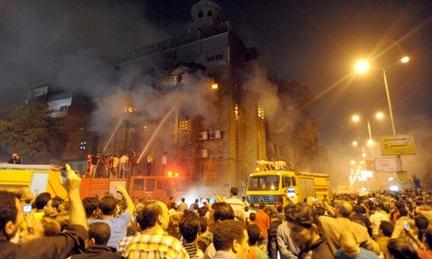 Egypt's prime minister has called an urgent cabinet meeting following fatal clashes between Muslims and Christians in Cairo overnight, state media says.
Egypt's prime minister has called an urgent cabinet meeting following fatal clashes between Muslims and Christians in Cairo overnight, state media says.
Essam Sharaf has postponed a visit to the Gulf in order to discuss the violence that left 10 people dead and 186 wounded.
The clashes broke out after several hundred conservative Muslims gathered at a church in central Imbaba district.
They alleged a woman convert to Islam was being held there against her will.
What reportedly began as an exchange of words between protesters, church guards and people living nearby developed into a fully-fledged confrontation involving gunfire, firebombs and stone-throwing.
Two churches and some nearby homes were set alight, and it took some hours for the emergency services and the military to bring the situation under control.
The recurrence of yet another serious outbreak of communal violence - as the military government leads a faltering transition to democracy - is a worrying development for Egypt, the BBC's Jonathan Head in Cairo says.
'Regular thugs'
"Prime Minister Sharaf has called for an emergency meeting of the cabinet to discuss the regrettable events in Imbaba," Ahmed al-Saman, a cabinet spokesman, told the official Mena news agency.
State TV reported that Mr Sharaf had postponed his visit to Bahrain and the United Arab Emirates, which was scheduled for Sunday.
Both the death and wounded toll kept rising on Sunday morning, with state media putting the latest number of dead at 10 and injured at 186.
Witnesses said several hundred Muslims belonging to the Salafist movement gathered at the Coptic Saint Mena Church in the heavily-populated Cairo district of Imbaba on Saturday evening.
They were protesting over allegations that a Christian woman was being held there against her will because she had married a Muslim man and wanted to convert to Islam, Mena reports.
However, one person in the area, a blogger called Mahmoud, told the BBC that people who saw the violence break out thought that the perpetrators looked like "regular thugs" rather than Salafists.
He had witnessed the burning of a second church in the same district, al-Azraa, and said that many local people were very upset at the burning of the churches and had spent the night helping the firefighters put the flames out.
Election fears
Similar claims about women being held against their will have been made before by Salafist groups, who have become more assertive in the post-Mubarak era, our correspondent says.
In March, 13 people died in similar clashes in another neighbourhood. Last month, demonstrators in the southern city of Qena cut all transport links with Cairo for a week in protest over the appointment of a Christian governor.
Coptic Christians account for about 10% of Egypt's population, and have long complained of state discrimination against them.
Now they are expressing fears for their safety if hardline Muslims do well in the election scheduled for September, our correspondent reports.



